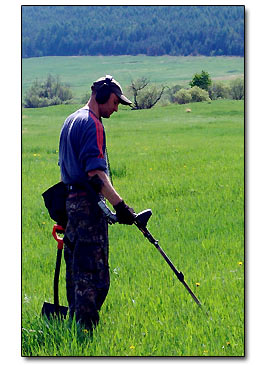Want To Learn Essentials Of Metal Detecting To Do It Right From The Start?
Here you will find 23 expert tips and practical advises with links to detailed articles and more!

How To Metal Detect Successfully - Beginner's Level
by Sergei UpstateNY, last time modified:
Serious metal detecting is an equation with a few variables such as 1) your detector that is suitable for your objectives, and "tells" you nothing but the truth, 2) diligent and dedicated research, 3) your knowledge and proper usage of metal detecting techniques and target-recovery methods, 4) your willingness to put effort into every step of the process, 5) your ability to maintain positive mental attitude, and 6) your full knowledge and understanding of your metal detector.
The latter is essential. A metal detector can do amazing things, but it can also confuse and disappoint you if you do not understand its "language" - audio responses to various targets, both good and bad. And you MUST know how to operate your detector and use it to its fullest ability, i.e. to make proper, timely adjustments under any search conditions encountered.
You should read the user's instruction manual for your detector as many times as needed to realize which key features, functions and modes of your machine make it the most effective and capable in metal detecting situations it is designed for, and possibly give it advantages over other detectors. As you begin metal detecting on a regular basis, your understanding of your detector will gradually grow.
Start with the factory preset search programs to learn the basics and then, after you familiarize yourself with the detector's audio (via Air Test and under real conditions) and behavior (at your Test Garden and under real conditions), begin the experimental phase of your learning process. The more you practise and experiment with different program settings, the quicker you will master your machine.
In the beginning of your metal detecting experience, the learning curve may be overwhelming, and, of course, it will be impossible for you to quickly understand "ins" and "outs" not only of your detector, but also of the whole process. Whatever questions you may have during the initial learning phase, write them all down, and then systematically search for answers using the Internet, books and interaction with the experienced detectorists.
Let your curiosity flourish and never be afraid of asking an expert a "stupid" question because such questions do not exist in any learning process. In most cases, this is understood by those possessing deep theoretical and practical knowledge because the experts used to be beginners too and climbed the learning curve themselves (and still continue doing so!).
Any difficulty in understanding the aspects of metal detecting can be easily overcome if you visit the metal detecting forums available on the Internet and read those threads, saved in the forum's archives, that might contain answers to your questions. You should also join a local metal detecting club and talk to weathered detectorists, especially the experienced users of the same detector-model as yours or similar to yours. The club members will provide you with lots of useful information and practical tips.
At the club meetings, you will also meet people who are active in the field and willing to share not only their success stories, but also their practical knowledge. And perhaps you will find yourself a good partner. That is also very important as two partners attuned to working well with one another are less prone to missing "hot" spots during the joint search and exploration of any hunt site.
Detecting with a trusted partner is the best way to go. In any metal detecting activity, adverse, sometimes unpredictable, situations may occur, and you may need help or assistance. If you are alone under extreme circumstances and do not have enough experience to overcome the adversity, you can get in serious trouble. Working in tandem with your partner or in a group of treasure hunters is always beneficial not only in terms of the number of good finds, but also in terms of everyone's safety.
Teamwork is especially important for coin cache hunting which includes certain search methods and strategies that differ from the common coin shooting, and require more participants for higher efficiency leading to successful outcome.
A good example is a search strategy used by the coin cache seekers hunting in pairs and using different advanced metal detectors fine-tuned to the current detecting conditions. Step #1: any search area is equally divided between two cache hunters. Step #2: each hunter combs his/her half of the area in a strict gridding pattern. And after that is done, the hunters proceed with Step #3: they change places and repeat the process; thus, making their chance of hitting the jack pot much higher than that of a lone coin cache hunter.
On the following pages you will find useful tips and information related to metal detecting and treasure hunting on land. To learn about Beach/Surf/Underwater detecting, please visit my Guide To Types of Metal Detecting and other sections of this web site. Please feel free to submit your own practical tips and advices that could help others! (CONTINUED on Next Page...)